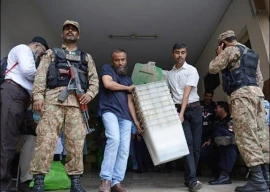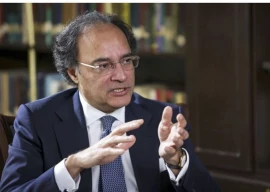
ISLAMABAD:
United Nations Economic and Social Commission for Asia and the Pacific (ESCAP) has kicked off research in Pakistan to assess livelihood opportunities for people with disabilities (PWDs), it has been learnt.
While talking to The Express Tribune, Special Talent Exchange Program (STEP) President Muhammad Atif Sheikh said the ‘The Disability, Livelihood and Poverty Action Research Project’ will be carried out in 10 countries in the Asia Pacific region.
He said it is going to be the first survey on livelihoods for PWDs under which job opportunities and hurdles faced by these job seekers will be analysed. The survey began in January and will be completed by April this year. All the countries will share their findings and will chalk out strategies for the new decade, he said.
Sheikh expressed his disappointment over government’s failure to devise any mechanism to implement the Convention on the Rights of Persons with Disabilities which it ratified in 2011. He called it “unfortunate” that the jobs that are being advertised in print do not contain quotas for PWDs.
Broken dreams
Asad Bilal, 33, dreams of living independently with financial stability, but his disability has become a major hurdle in the path to achieving these dreams.
“He has tried his luck at many places, but when people see his disability, they refuse to offer him work, saying that a person who can’t hear or talk can’t work,” Bilal’s mother, Nelofar told The Express Tribune.
Continuous refusals and discouraging comments have also hurt Bilal’s self-esteem. “He also tried for government jobs but got no response from there,” she said.
Bilal finished college but never went to university because it was difficult for him to travel to Rawalpindi as the public transport system is not “disability-friendly”.
Talking to The Express Tribune, National Council for the Rehabilitation of Disabled Persons (NCRDP) Deputy Director Rana Saeed said there is a two per cent job quota for PWDs and every public and private organisation is bound to follow this. “After setting a job quota for PWDs, it is the responsibility of all organisations to follow it,” he said.
He said there is currently no data available on the number or nature of jobs offered to PWDs in the country.
A senior human resource manager at a private organisation said that although the company is aware of the fact that there is a quota for PWDs, they are still not given a chance. “It is just because some people have a misconception that PWDs cannot work at the same pace, and they are usually discouraged,” he said.
He added that many offices in the capital are inaccessible to PWDs due to the absence of ramps and other facilities.
A representative from an organisation in Blue Area, one of the main business districts of the capital, said that most of the offices here cannot hire physically disabled persons as there is no ramp or elevator in most of the buildings. “They were constructed quite some time ago, it is difficult for the companies change all of that now,” he added.
Published in The Express Tribune, February 21st, 2012.


































































COMMENTS
Comments are moderated and generally will be posted if they are on-topic and not abusive.
For more information, please see our Comments FAQ